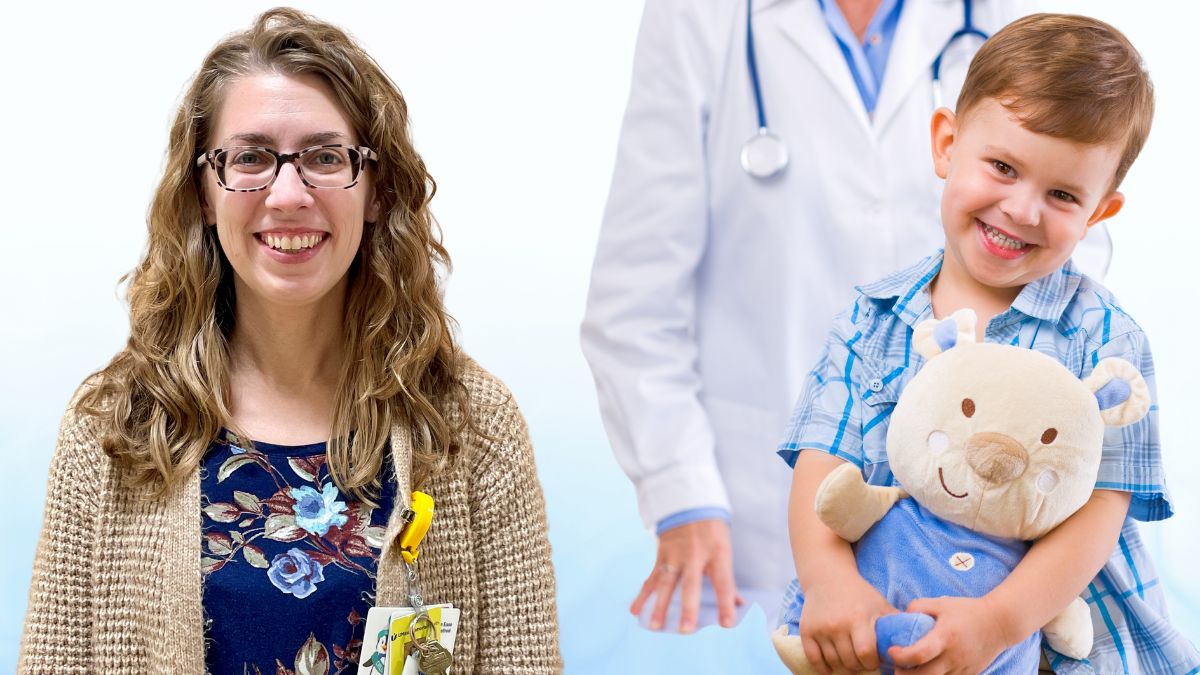Role of a Certified Child Life Specialists in Diabetes Care

What is a Child Life Specialist?
The Certified Child Life Specialist at the UMass Memorial Diabetes Center of Excellence supports children and families as needed, beginning at their very first office appointment. She works closely with the pediatric diabetes care team to provide age appropriate support and interventions including therapeutic activities in the waiting room and exam room, procedural support, medical and recreational play, developmentally appropriate education and general family support.
Assisting families during office visits
- Assessing how the child is doing with fingersticks, injections, and rotating sites. Developing incentive/reward charts with pre-school and younger elementary students as needed to reinforce positive diabetes care.
- Socialization and managing life with diabetes at school, with siblings, and other peer relationships.
- Reducing stress, anxiety, and fear of medical staff, D.K.A., hypoglycemia, injections, etc.
- Transitioning to continuous glucose monitors and/or insulin pump therapy.
Types of interventions
There are different strategies and interventions for helping infants and toddlers (newborn to two years old), preschoolers (2-5 years old), school age (5-12 years old) and adolescents (12 years and up).
The Role of a Child Life Specialist
in Diabetes Care
Helping a school-aged child with Type 1 diabetes
"A second grader was coming into the clinic for his second visit after being diagnosed with type 1 diabetes. He was quiet and shy when I greeted the family. While introducing myself, I gave him a special activity to work on during his visit: Diabetes Bingo. I told him if he got a Bingo, he could pick a special prize at his next appointment. He accepted the game and crayons, and immediately started looking at the pictures on the board with his parents.
At this child’s next visit, he excitedly shared with me that he got Bingo multiple times and there was only one picture on the entire board he was unsure of. His parents told me how he recognized more of the pictures of Diabetes tools & terms than they did. He he was even able to explain the pictures accurately to them! I sat down with him to review the one picture he didn’t know, which he quickly identified by looking around the exam room. He happily chose his prize, along with some Play Doh to play with during his visit.
The Bingo game & Play Doh accomplished many things between those two visits. He started to look forward to clinic visits and learned that clinic is an inclusive place where he can be a kid. The child continues to expand and share his knowledge of diabetes, setting the stage for being a collaborator in his own care.”
Teens and needles
"I was asked to help support a 14-year-old girl through her blood draw one day following her appointment. Upon hearing that she had to go to the lab, she became quiet and teary, and told her endocrinologist that she hated needles. Before she and her Mom walked to the lab, we sat together and talked about a plan. We discussed how blood work has gone for her in the past, what helped, and what didn’t. We tried some numbing options and developed a coping plan that included cold spray for numbing, holding Mom’s hand, and conversation about music for distraction. This teen walked to the lab with me and her Mom knowing that her plan and the tools we discussed would help her through it. After the initial poke, she broke into a big smile and said, 'That’s it? I barely felt it. That was the best blood draw I’ve ever had!'
Before they left, we wrote down her plan together on a Kid’s Comfort Promise passport card, so she and Mom could share the plan with her providers whenever needed. This teenager not only had a positive healthcare experience, but started to develop the skills to express her concerns and advocate for herself.”
Care Team Spotlight: Keri Walko-Henry, ATR, CCLS, LMHC
- Bachelor's degree in Psychology from Ithaca College
- Master's degree in Art Therapy & Mental Health Counseling from Lesley University
- Keri grew up in Buffalo, NY and currently lives in Westborough, MA
- She has two children & two fur babies, Maggie & Bingo
- Enjoys reading, visiting museums, hiking, and going to the ocean
- Favorite TV Shows: Ted Lasso, Veronica Mars & Bluey
"I love meeting families in clinic and helping make the space more playful and sensory inclusive. Being able to foster moments of joy and play during a medical visit, and collaborating with other team members in supporting our patients, makes clinic a wonderful place to be."
Diabetes Center of Excellence Care Team Spotlights
Victoria Andersen - Clinical Nutritionist & Diabetes Educator
Cheryl Barry - Certified Diabetes Care and Education Specialist
Taylor Boudreau - Nurse Practitioner
Ashley Bustos - Diabetes Educator
Fernanda Costa - Certified Diabetes Care and Education Specialist
Clare Foley - Nurse Practitioner
Lindsey Gurry - Nurse Practitioner
Christine Hoogasian - Nurse Practitioner
Susan Kim - Nurse Practitioner
Nancy Morris - Nurse Practitioner
Mark O'Connor - Endocrinologist
Prateek Shukla - Endocrinologist
Nancy Sidhom - Nurse Practitioner & Certified Diabetes Care and Education Specialist

